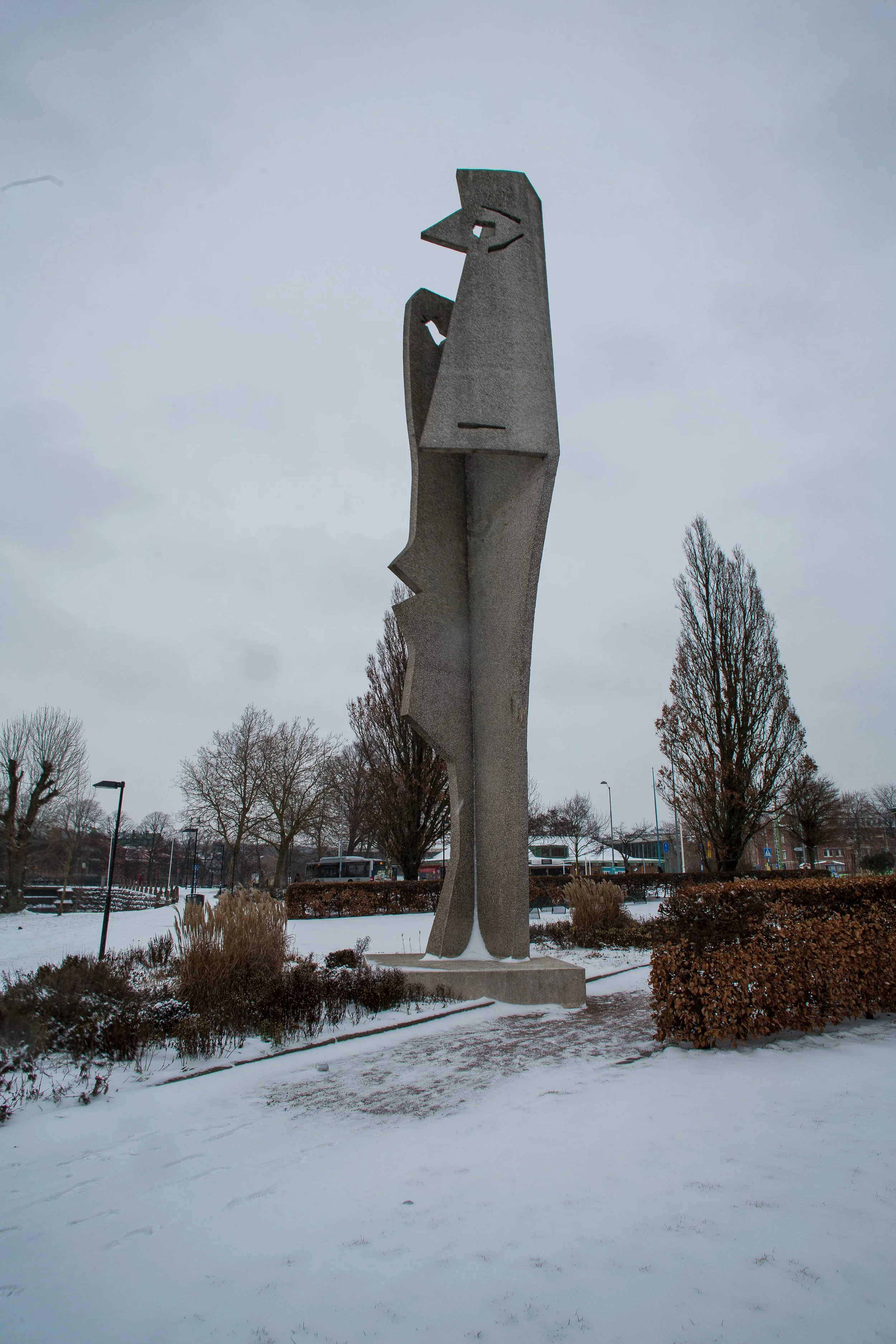Halmstad
Halmstad is a noticeably larger town than Varberg, though not so large as Gothenburg. Like Gothenburg it is divided by a river, but separating the city into the east and west with teh west being the old town with the old buildings and the east being newer.
The city has a small town feel, despite its comparative size, perhaps because I was there on Sunday and very little is open on Sunday. Clas Ohlson of course being the exception. The cafes and later in the day restaurants were all open, but shops were largely closed.
Most of the shopping is, like Varberg, cantered in a few blocks in the old town near to the castle. Over the river, the most obvious and impressive building is the Konsthall.
Sights & Culture
Stora torg
In the centre of old town is Stora Torg, the ‘large square’ or ‘great square’ with a fountain in the centre. During winter, it was peaceful, and pristine with snow hiding the stones of the square, and ice in the fountain. In the summer, you would expect a bustling market place here.
Skogsvaktartornet Galgberget
High up on a hill, past the open air museum is the Skogsvaktartornet, the ‘forest guarding tower’. During its open season, you can climb the tower to get views over Halstad, but during the winter you must content yourself with views of the tower itself.
Halmstad Slott
Situated on the riverbank, at the foot of old town, the castle is a deep terracotta red. Entrance is through the north wall into the main courtyard. During the summer months, the buildings are opened to the public, but the castle is closed through the winter.
Behind the castle is the grounds including the moat. These are not accessible during winter as they are fenced in from the road and require access through the castle itself.
Though slott is traditionally translated to castle, in most cases I have seen it could more appropriately be translated to manor house, it is the fästning, such as you see in Varberg that are more reminiscent of traditional castles.
St Nikolai kyrka
Facing Stora Torg, St Nikolai Church is an imposing building in the centre of the city. Like most Churches in Sweden it seems to see little traffic through its large wooden doors, but it remains the visible landmark and reminder of part of Sweden’s past.
Museums & Galleries
Public Art
Halmstad is rightly proud of its public art, around the city there are statues and graffiti enlivening the city and its people. From the Picasso Head in the Picasso Park:
To Pi opposite the Konsthall
And the anti-gun violence statue you can also see in Gothenburg and Stockholm
As well as the unseen ‘burial’ a 1m cubed stone block buried without trace, as it is the art, not the display that is important gives the visitor a good reason to explore the city by food.
Halmstads Konsthall
In a new building, on the east side of the river (actually both on the river bank and on pylons on the river itself, the Halmstads Konsthall is primarily a library and community space, with a corner set aside for artworks. The gallery had a collection of local works, primarily paintings, but a small number of photographs of famous people taken by a local photographer.
Mjellby konstmuseum
About five kilometres outside of Halmstad is the Mjellby Konstmuseum. The easiest way to access it is via car, and it is a short drive, but it is also possible to get there via bus, there is one bus, that runs less than once an hour to an eponymously named bus stop about seven minutes walk away from the museum. That seven minutes is a long walk in the driving snow with nothing to protect you but open fields in both directions. Equally, you need to be conscious of the time until the next bus as they are so infrequent.
These issues aside, the museum is excellent. The staff were deeply knowledgeable and when hearing I was english, and perhaps taking pity on my bedraggled state due to the weather, they explained all the exhibits currently being shown.
The permanent exhibitions are based around the Halmstadgruppen, the Halmstad Group, who are Sweden’s connection to Cubism and Surrealism (and the reason for the Picasso statue and park). The museum itself was created by one of the groups daughters, a noted writer of art history.
The museum also features an art space, allowing visitors to express themselves and post it on the walls for everyone to see. Artist smocks are even provided incase you get really into it.
The main exhibition at the time of my visit was the Guerrilla Girls, an anonymous artists collective who have charged themselves with challenging the substantial lack of diversity found in art museums around the world. The main section was their survey work, itself posted as an artistic piece where they asked over three hundred art museums and galleries to answer questions on the diversity of their collections and shows. Less than a third responded. Those who failed to respond have pride of place on the floor where patrons are encouraged to walk all over them.
The statistics are powerful, and somehow not surprising. Whilst it has not been something I have actively considered, when laid out, it was something I had always subconsciously known. Art, particularly art history is white men. European white men.
There are also a series of examples of their other works, often frames as questions with bitingly sarcastic answers or by a careful rephrasing of the inherent sexism. One of the most surprising pieces of information to me was that the US Senate, long derided for its conservative traditional make up, is dramatically more representative than Hollywood. Film directors are 94% white men, the senate is ‘only’ 75%.
Hallands Konstmuseum
The Halland Konstmuseum is currently closed for refurbishment and rebuilding, due to open again in autumn 2019.
Parks & Gardens
Picasso park
North of the castle and south of the Konsthallen is Picasso park, even from a distance you can see the sculpture that gives it its name, a stone woman’s head (based on his wife Jacqueline Roche), one of sixteen unique sculptures donated to cities around the world. This one was created and installed by Norwegian sculptor Carl Nesjar, working on Picasso’s behalf. There are other works, but local artists in the part as well, and the view along the river is lovely.
Slottsparken
Opposite the castle is a small park with a lake. In the summer no doubt a popular place to spent an afternoon, it was blanketed in snow during my visit, which was beautiful it its own way.
Hallandsgården
On a hill above the city, the open air museum of Hallandsgården sits. On a much smaller scale than the similar museum in Oslo, it gives a good impression what a small village would have been like centuries ago. Traditional wooden buildings and a blanket of snow convince you that out of season, the locals would have remained inside, by their fires keeping warm.
Restaurants & Bars
Shady Burgers
Not quite gourmet burger, not quite fast food, Shady straddles the line between an easy and fast burger and a more sit down experience. The burgers are good and the fries plentiful.
Pizzeria Capri
A small cosy pizza place on the main street. Popular takeout place for the locals as well as a nice place for a meal.
Cafe Nosh
Stopped for an evening coffee to kill half an hour, this large venue is part bar part coffee shop. It’s aiming for an up market look, but doesn’t quite pull it off.















